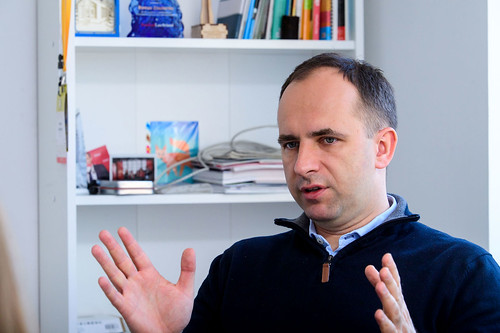
Solar panels on blinds: how a Ukrainian energy innovation is achieving worldwide success
Energy independence is increasing in Ukraine, and the number of innovations that help to achieve this is also on the rise.
The issue of energy efficiency remains relevant for Ukraine. Ukraine’s economy one of the most energy-intensive in the world. Artificially low energy prices over the course of many years have not motivated Ukrainians to save on energy or to invest in improving energy efficiency through thermo-modernisation, nor have they encouraged the country to look for alternative sources. The EU is supporting Ukraine through various programmes in order to become more efficient and to reduce the waste of energy now when Ukraine pays the market price for the energy.
The situation has changed also in the field of use of renewables. Climate-friendly technologies have become a popular solution in home life and business alike, and green energy has evolved into a new segment of the Ukrainian market.
EU Sustainable Energy Week is taking place on 4-8 June to promote the idea of energy efficiency. Representatives of the public, local authorities, energy agencies and enterprises interested in organising Energy Days can host and register their respective events on the EU Sustainable Energy Week website (www.eusew.eu), in order to ensure that their days get maximum coverage.
In addition, a number of programmes are working in Ukraine with EU support and helping spread climate-friendly innovations by providing consultation and financial assistance, additionally to reducing the energy consumption and increasing energy efficiency.
Innovation vouchers for climate-friendly businesses
One of the energy efficient programmes developed by the European Bank for Reconstruction and Development (EBRD) with EU financial support was implemented by the Ukrainian energy innovations organisation, the Greencubator. The organisation launched the Climate Innovation Vouchers programme to support companies that develop climate-friendly technologies.
Through the programme, fifty Ukrainian companies that are working to decrease harmful impacts on the environment can get vouchers for between €20,000 and €50,000.
“The Innovation Vouchers programme has a budget of €1 million,” says the co-founder of the Greencubator and the head of the Climate Innovation Vouchers programme, Roman Zinchenko. “To receive a voucher, the company must apply and show the market potential of the technology, its connection with other sectors and a positive effect on the climate and innovation.”
The programme not only provides financial support, but also helps the newly-developed technology to access the international market. The company has to launch the project, and after that it will receive compensation of 75 per cent of the amount spent.
Green technologies are becoming more popular in Ukraine. So far, over 130 companies have applied and 15 of them have already received vouchers.
A substantial number of companies supported by the programme are export-oriented. “Climate change disregards national borders; that is why we introduce climate technologies anywhere on the planet where they can positively affect the general climate situation and common efforts in preventing the catastrophe,” says Roman Zinchenko.
 Roman Zinchenko, co-founder of Greencubator and manager of the EU-funded Innovation Vouchers programme, Kyiv, Ukraine.
Roman Zinchenko, co-founder of Greencubator and manager of the EU-funded Innovation Vouchers programme, Kyiv, Ukraine.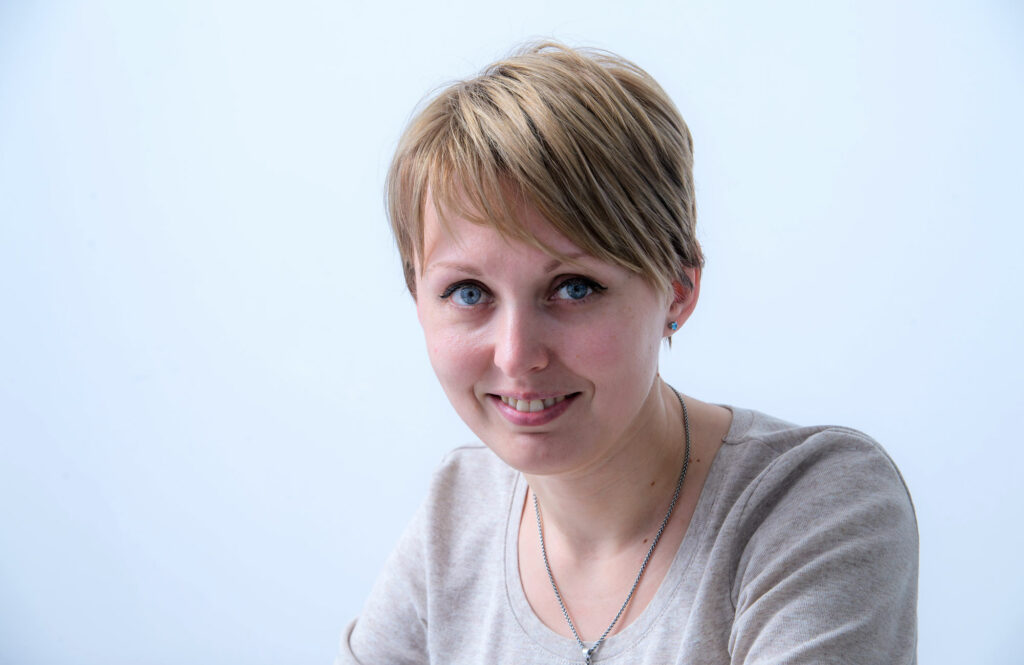 Nadiia Artemieva, grant programmes coordinator, Greencubator, Kyiv, Ukraine
Nadiia Artemieva, grant programmes coordinator, Greencubator, Kyiv, Ukraine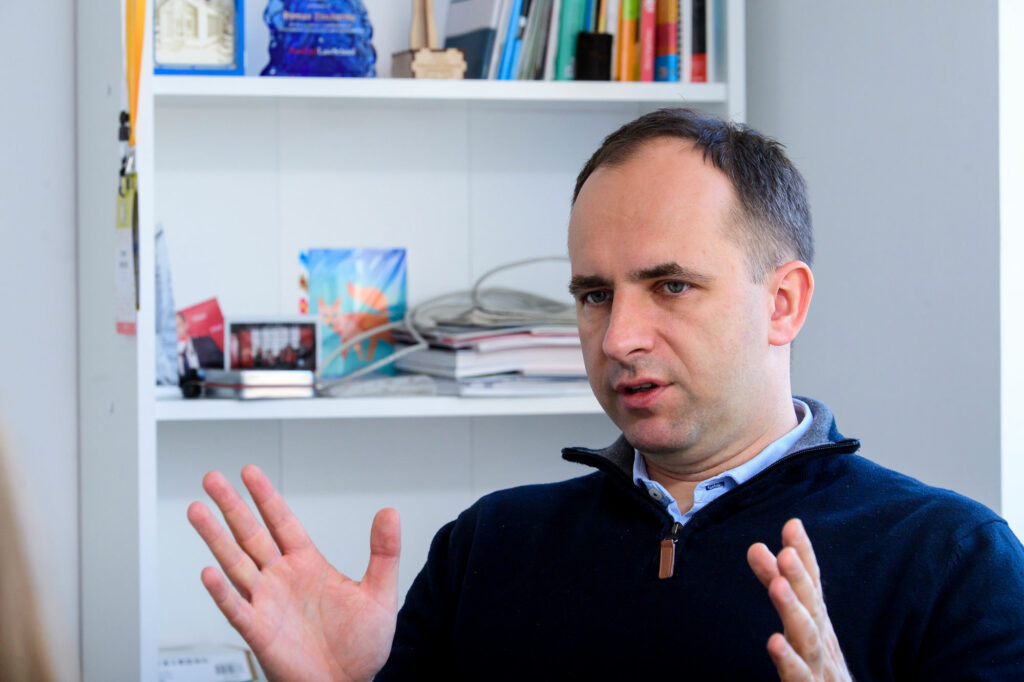 Roman Zinchenko, co-founder of Greencubator and manager of the EU-funded Innovation Vouchers programme, Kyiv, Ukraine.
Roman Zinchenko, co-founder of Greencubator and manager of the EU-funded Innovation Vouchers programme, Kyiv, Ukraine.
SolarGaps: a Ukrainian start-up that works in the field of energy efficiency
One Ukrainian company that has created a product with climate-friendly technologies is SolarGaps. The company has designed smart blinds with solar modules on their surface. The company won a grant from the EBRD-EU Climate Innovation Vouchers programme in January 2018.
“Our technology allows residents of multi-storeyed buildings to generate energy from their windows. Since 70 per cent of the population live in multi-storeyed apartment blocks and work in business centres, they cannot afford to install solar panels on the roofs,” says the director and founder of SolarGaps, Yevhen Erik.
Yevhen started working on the idea of an energy efficient residential building in 2015. Having realised that the energy produced by the solar panels on the roof would be insufficient, he tried to place them on the windows. However, such placement of solar modules was ineffective, since there was no chance for automatisation and the sun’s rays were not falling at the right angle
Blinds that can change the inclination angle of solar panels during the day became the solution.
“The main problem of solar panels located on the roof is that they are placed at the wrong angle. During winter, the sun is moving very low under the horizon and in order to catch it, it has to be followed. Our blinds can do it,” says Yevhen.
Depending on the size of the windows, smart blinds can supply an apartment with electricity during at least half the year.
“The effectiveness of four windows in an apartment which is equipped with external solar blinds is about 150 kilowatts per month,” explains Yevhen Erik. “Additionally, during warmer months, the blinds block the heat. About 2 kilowatts of energy per hour are spent on cooling down a room with an air conditioner, which can be compared to the amount of energy which is produced by eight large panels on the roof. As a result, the air conditioner spends ten times less. SolarGaps will not only produce energy for you, but also will not let you spend additional energy on the air conditioner.”
The blinds can be managed from a smart phone application. Most of SolarGaps’ clients live in Europe and the USA, as well as some in Ukraine.
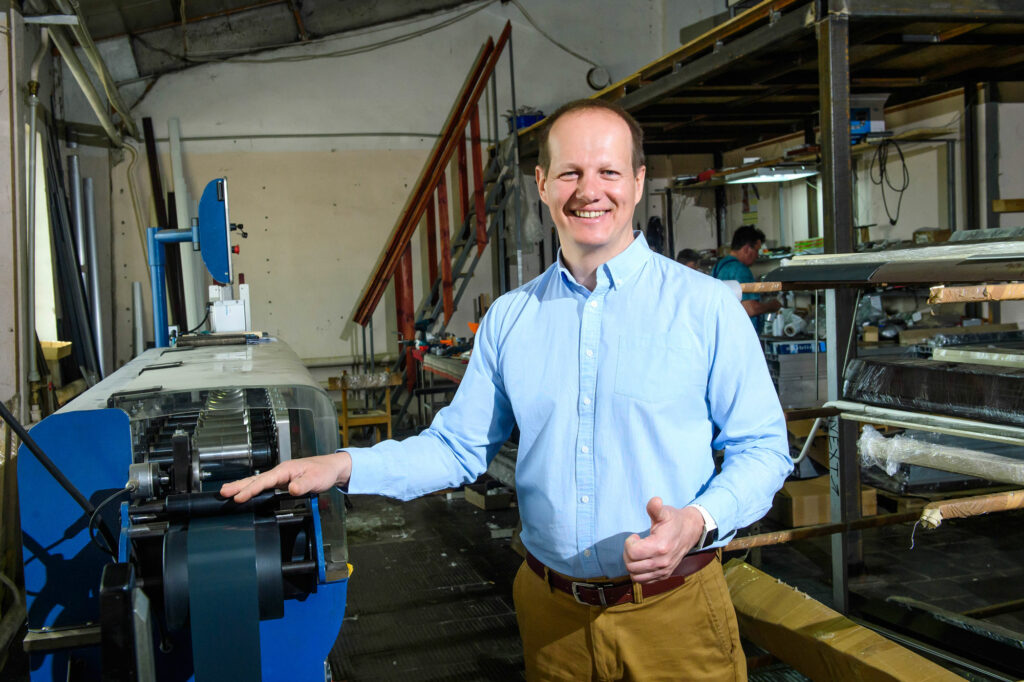 Yevgene Erik, CEO and founder of “SolarGaps” in Kyiv, Ukraine
Yevgene Erik, CEO and founder of “SolarGaps” in Kyiv, Ukraine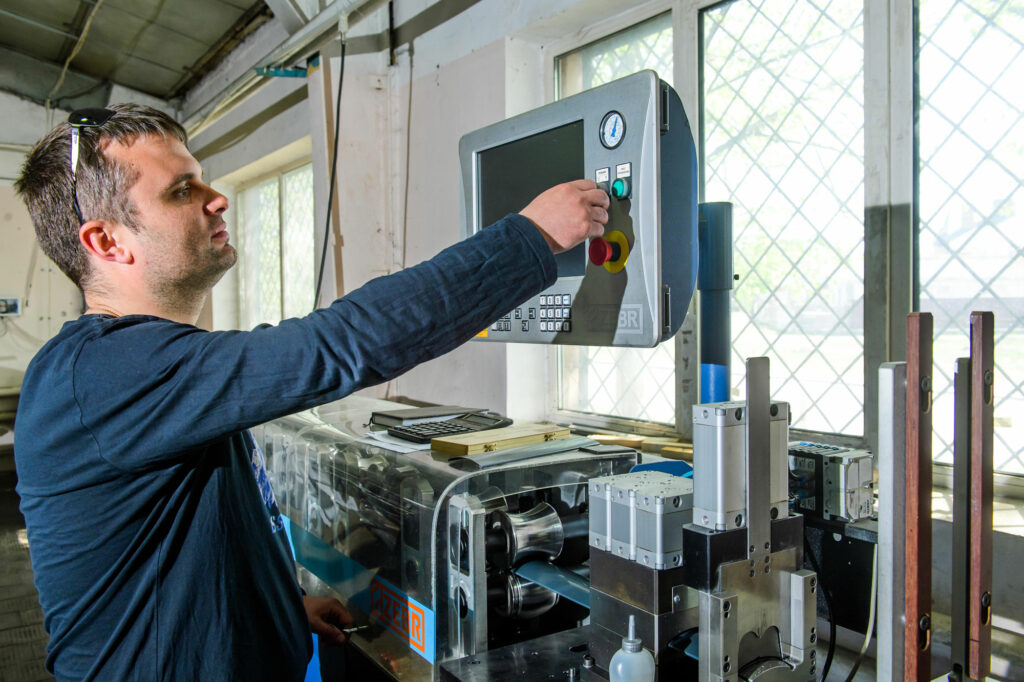 Solar blinds, produced by “SolarGaps” in Kyiv, Ukraine
Solar blinds, produced by “SolarGaps” in Kyiv, Ukraine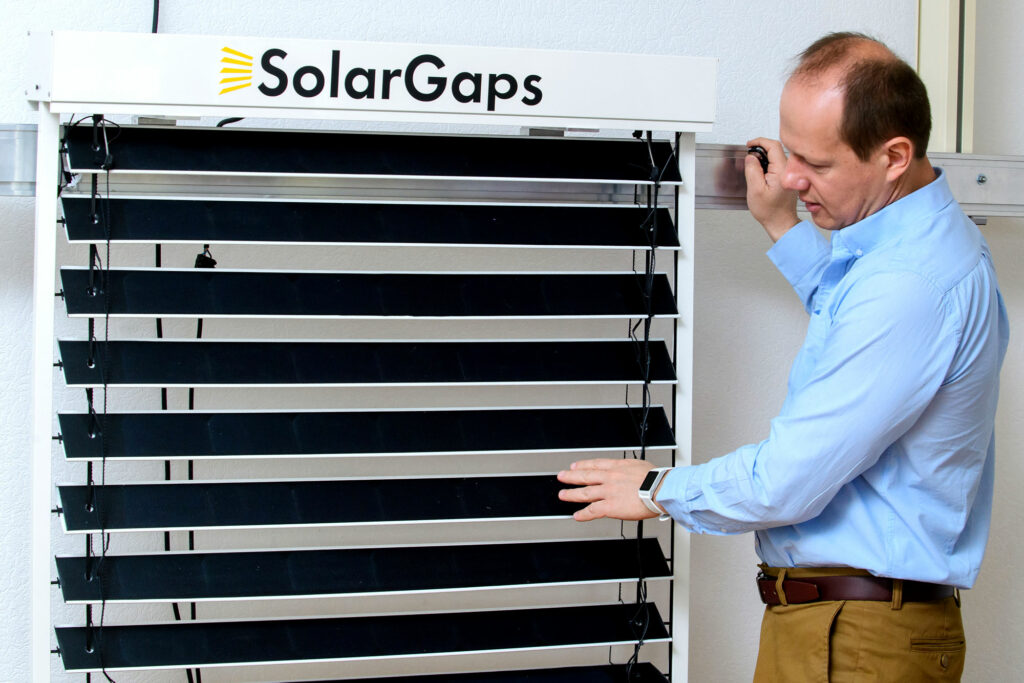 Yevgene Erik, CEO and founder of “SolarGaps” in Kyiv, Ukraine
Yevgene Erik, CEO and founder of “SolarGaps” in Kyiv, Ukraine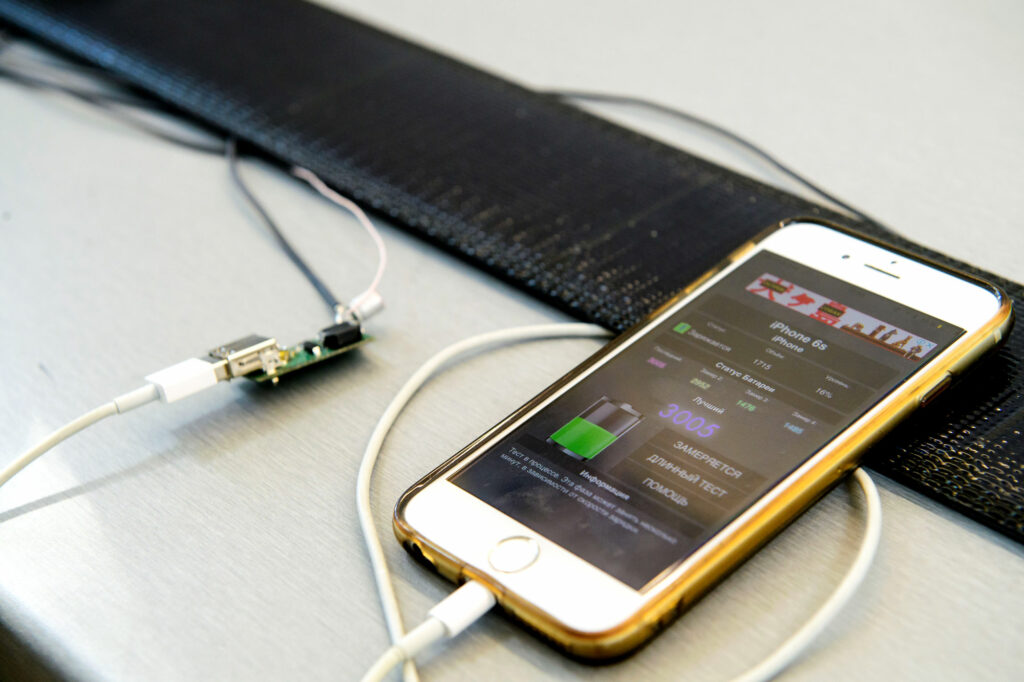 Testing the solar blinds, produced by “SolarGaps” in Kyiv, Ukraine.
Testing the solar blinds, produced by “SolarGaps” in Kyiv, Ukraine.
“Our clients are from all over the world,” says the head of the external economics department at SolarGaps, Dmytro Hehelskyy. “Ukraine, as a country where electricity is almost the cheapest, is not the most optimal market for our product, which is why we are oriented towards exports. In Ukraine, people are interested in SolarGaps because they strive to be independent. People want to be able to work on their computers, charge their phones or watch TV in case the power is shut off,” he adds.
In Ukraine, it costs €300 per m2 of window to install the blinds. SolarGaps’ blinds allow customers not only to save energy by using the energy they produce, reducing harmful impacts on the environment in the process, but also allow them to store up the energy and sell it to regional power companies at “green” tariffs.
The blinds adapt to the habits and schedule of their users and have a few scenarios. The application has a built-in setting that users can programme the blinds to wake them up with sunshine and close at night when they need their quiet time. They also have built-in motion sensors so that they open when a person enters the room.
“Our job is to create a solution which will adjust to your work schedule and habits. Such blinds can become a natural component of a smart house,” explains Yevhen.
SolarGaps are working with Google Home and Amazon Alexa, which promote the Ukrainian technology. At the moment, a team of developers are also working on integrating it with Apple HomeKit.
Innovators believe that, in the future, we will be able to sell and buy energy produced by solar panels.
“The thing that happened with the internet at some point can happen with energy as well, when one large network of users is created,” Yevhen says. “It will be affordable when the user network expands. Energy can become a new currency, since practically all other equipment, all technologies use electricity. It will become a great breakthrough and we will be a part of it,” he adds.
“Each step we take increases the number of potential investors and clients. Therefore, this Innovation Vouchers programme is not only about money. The main thing is a possibility to reach out to people with whom it was difficult to talk before,” explains the founder of SolarGaps.
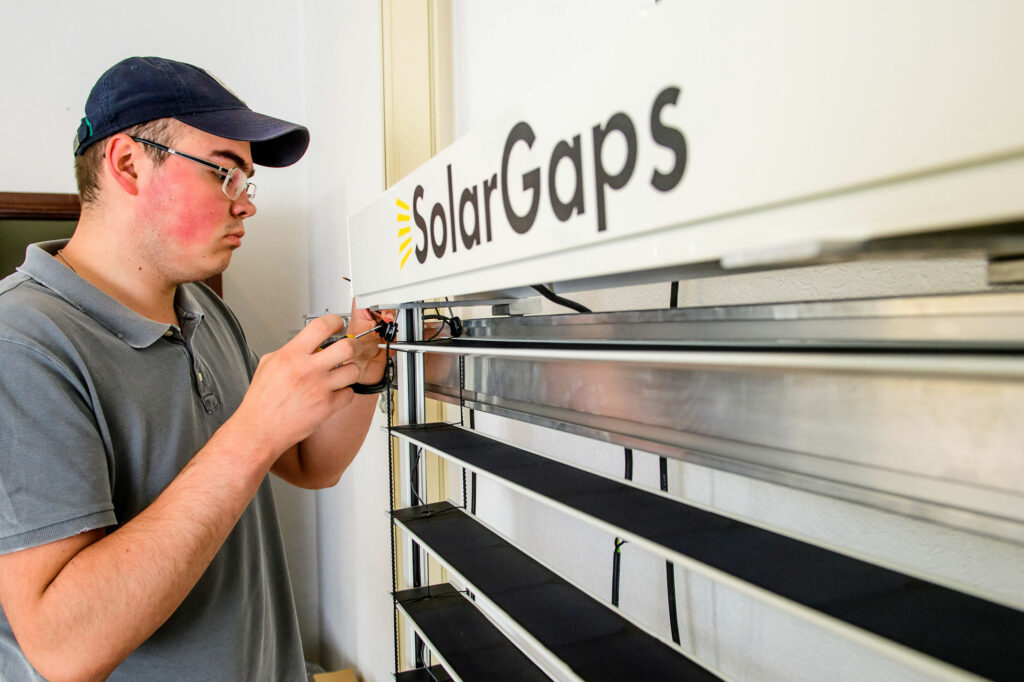 Solar blinds, produced by “SolarGaps” in Kyiv, Ukraine
Solar blinds, produced by “SolarGaps” in Kyiv, Ukraine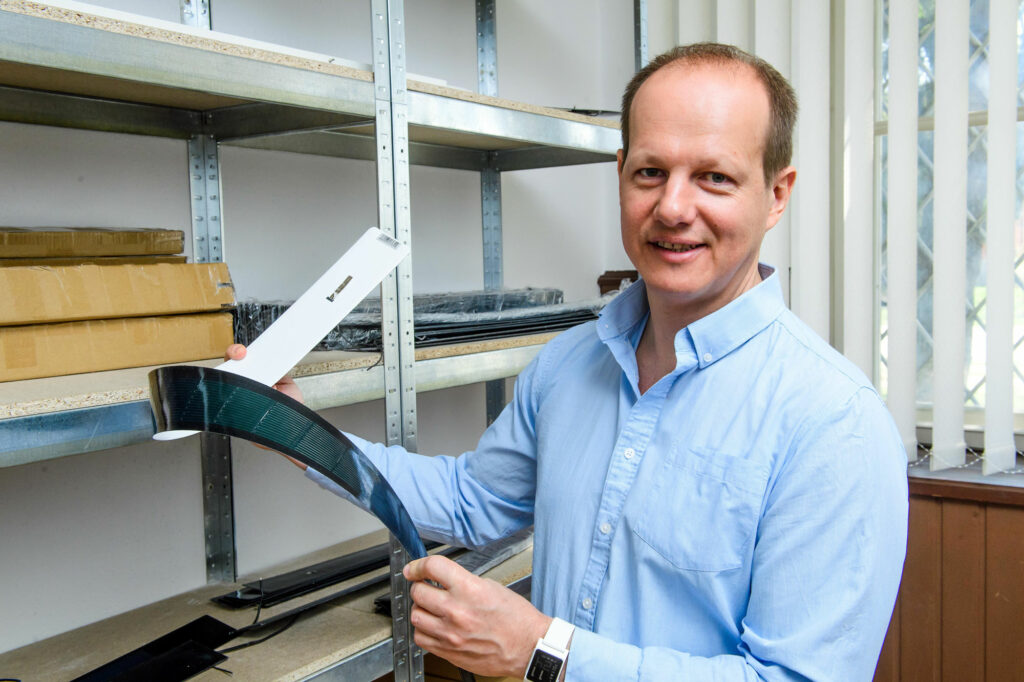 Yevgene Erik, CEO and founder of “SolarGaps” in Kyiv, Ukraine
Yevgene Erik, CEO and founder of “SolarGaps” in Kyiv, Ukraine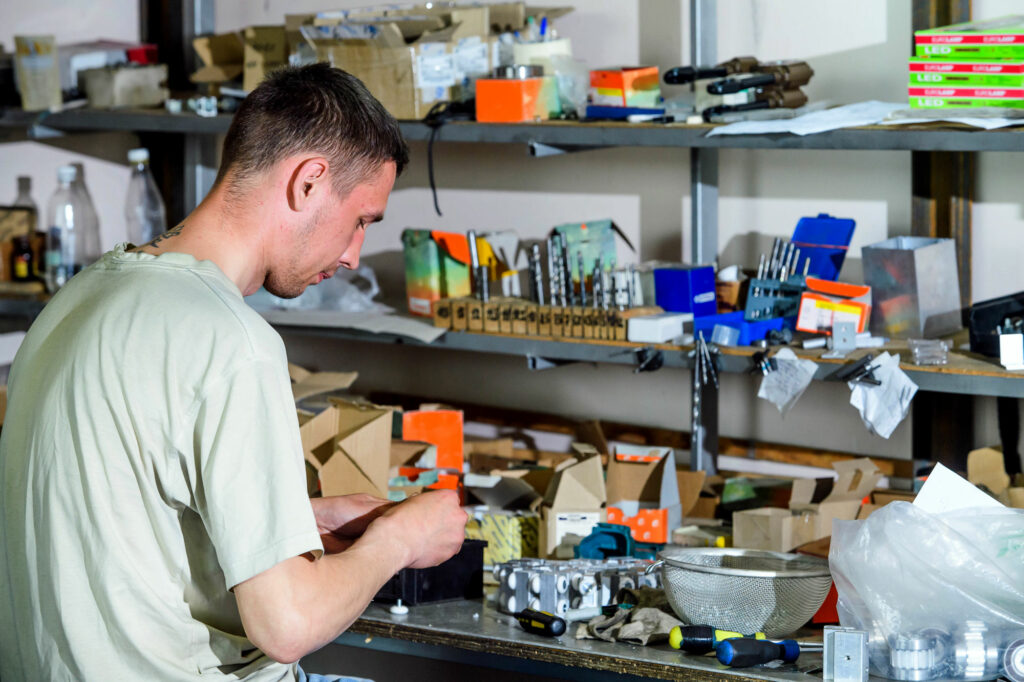 Sergey Tkach, assembler at “SolarGaps” in Kyiv, Ukraine.
Sergey Tkach, assembler at “SolarGaps” in Kyiv, Ukraine.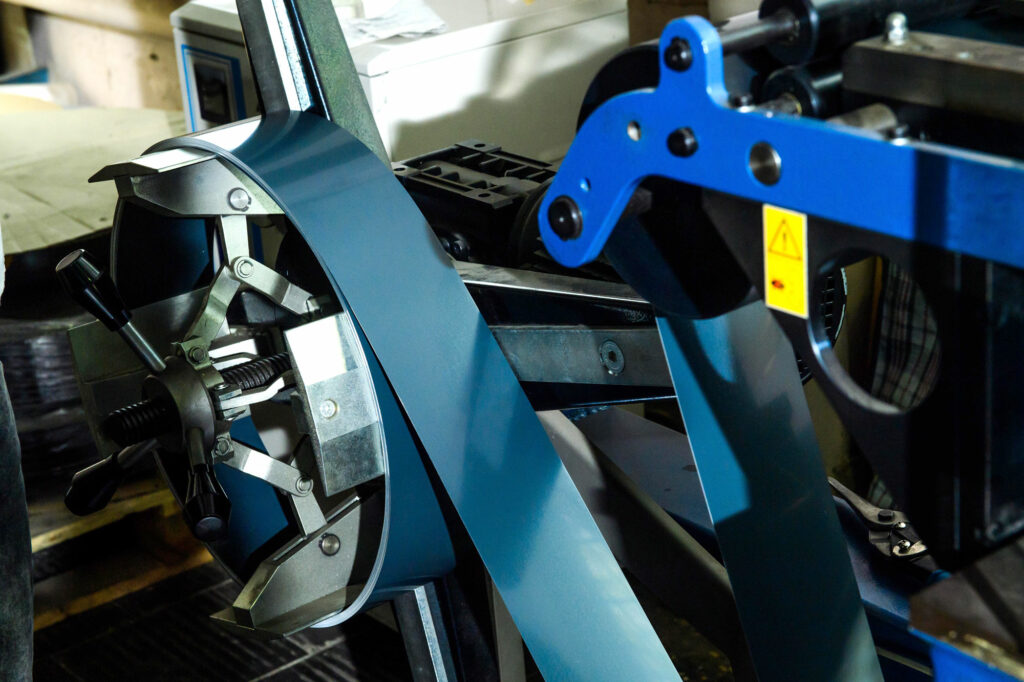 Solar blinds, produced by “SolarGaps” in Kyiv, Ukraine
Solar blinds, produced by “SolarGaps” in Kyiv, Ukraine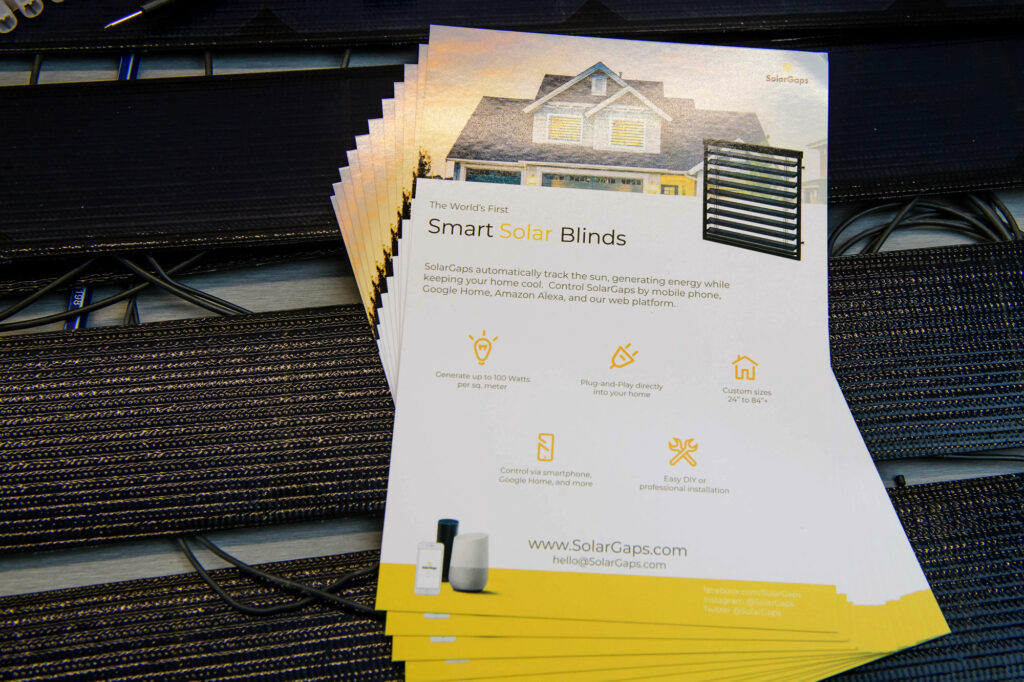 “SolarGaps”, Ukraine
“SolarGaps”, Ukraine
“When the EBRD or the EU provide their support and demonstrate their trust in the company, owners of large houses or hotels start showing interest in the technology.”
Aiming for clean energy use should go hand in hand with more efficient use of energy. Developing renewable energy sources are the key in fighting climate change and reducing CO2 levels in atmosphere. At the same time, EU’s priority is to support Ukraine in becoming energy efficient: from one of the most energy-intensive countries to a modern European country.
Opting for renewable energy sources, as well as reducing energy consumption and investing in energy efficiency will have a cumulative effect and will pay off well, resulting in significant reduction in energy bills, reduced pollution and better understanding of energy efficiency.
Author: Darya Tarasova
Article on Espreso.tv in Ukrainian
MOST READ
SEE ALSO

‘The Kremlin has entered the chat’: how to protect your personal data on Telegram and avoid the bait of propaganda

No, time is not on Russia‘s side
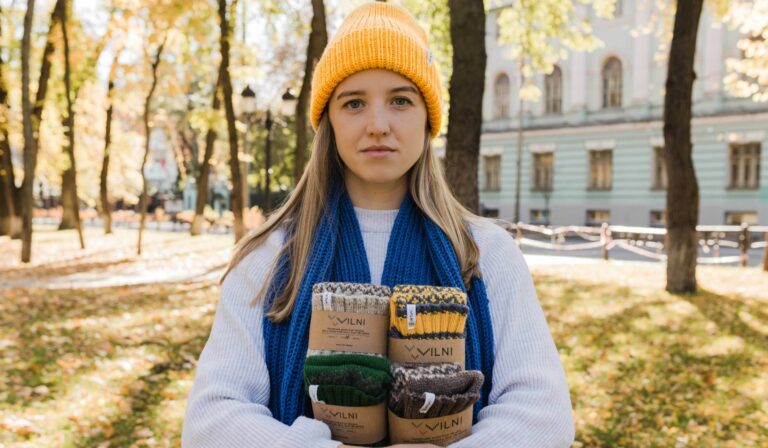
Socks for Peace: how the Vilni project is supporting internally displaced women in Ukraine
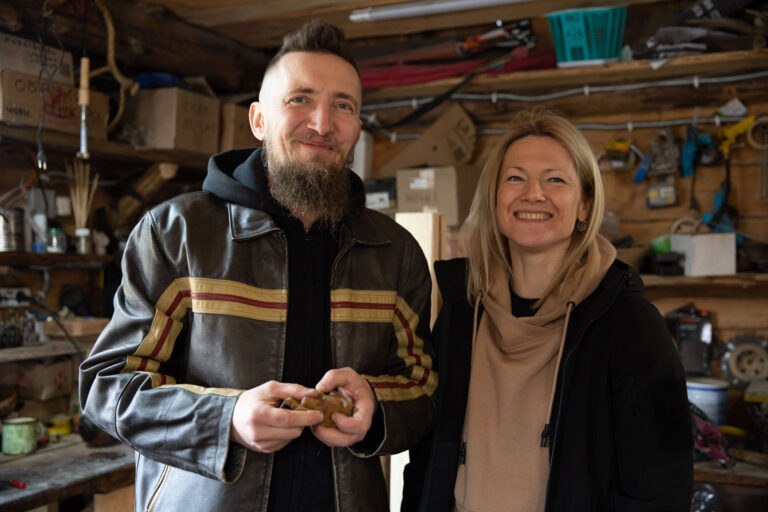
Celebrating traditional Ukrainian cultural identity in Rivne

Natalia wanted her child to escape the war: how a single mother set up a successful business in Lithuania
More campaign pages:
Interested in the latest news and opportunities?
This website is managed by the EU-funded Regional Communication Programme for the Eastern Neighbourhood ('EU NEIGHBOURS east’), which complements and supports the communication of the Delegations of the European Union in the Eastern partner countries, and works under the guidance of the European Commission’s Directorate-General for Neighbourhood Policy and Enlargement Negotiations, and the European External Action Service. EU NEIGHBOURS east is implemented by a GOPA PACE-led consortium. It is part of the larger Neighbourhood Communication Programme (2020-2024) for the EU's Eastern and Southern Neighbourhood, which also includes 'EU NEIGHBOURS south’ project that runs the EU Neighbours portal.

The information on this site is subject to a Disclaimer and Protection of personal data. © European Union,
